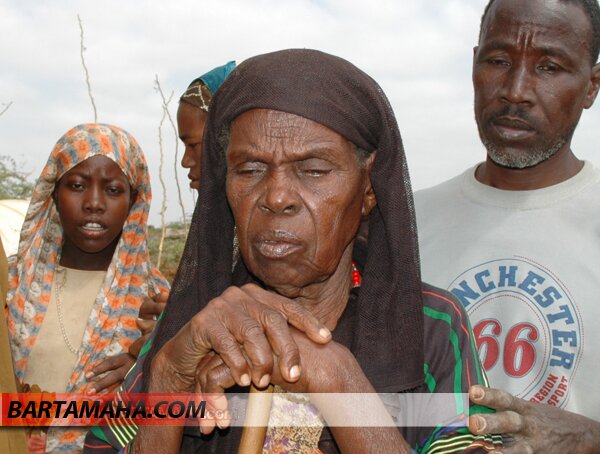DEFENDING PEACE AND JUSTICE AT ALL COSTS:
“All we are saying is give peace a chance…”
John Lennon, Political Activist (1940-1980)
“The best way to destroy an enemy is to make him a friend.”
Abraham Lincoln, 16th US President (1809-1865)
“Peace is not merely a distant goal that we seek, but a means by which we arrive at that goal.”
Martin Luther King, Civil Rights Leader (1929-1968)
Somalia has been wrecked by civil unrest for the past two decades. Millions of lives have been lost and countless others continue to be internally or externally displaced by the seemingly endless war. The tragedy of this brutal war will forever be etched in our national history and its brutal effects and aftermath will certainly haunt us for generations to come. It is therefore in this spirit of putting aside all our differences for the larger goal of uniting and rebuilding our fragmented and almost “disappearing” state, that I urge all my fellow brethren to stand together in unison and end all the mindless hostility that has wrecked our country for too many years. One of the best ways of uniting for the common good of the country is to defend justice and peace at all costs.
It is a well known fact that in the history of post civil war nation building, there is an inverse relationship between peace and justices. In order to achieve peace, war ravaged countries tend to put justice in the back burner for some time and this is usually displayed in the reconciliations processes that have taken part in places such as Rwanda. In the case of Somalia, warlords and militia who have massacred and caused havoc and mayhem to countless of Somalis have at times been given key government positions so as to achieve peace. Peace is used as the end goal and rewarding the warlords by offering them lofty MP positions is a means to get there. You may be asking yourself whatever happened to justice. There are people who believe that justice is the foundation of peace. If justice is compromised, then the foundational and structural process of rebuilding tattered nations will ultimately collapse. The way to get peace according to this school of thought is, to enforce justice. In the case of Somalia, that will mean to uphold the law and bring all the criminals to justice for the atrocities they committed regardless of their power or tribal affiliation.
JUSTICE AND PEACE:
“Injustice anywhere is a threat to justice everywhere.”
Martin Luther King, Civil Rights Leader (1929-1968)
“If you want peace, work for justice.”
Henry Louis Mencken, American Essayist (1880-1956)
“Four things support the world, the learning of the wise, the justice of the great, the prayers of the good, and the valor of the brave.” Prophet Muhammad (SAW), 570-632 AD
Recently, a friend of mine narrated to me a sad and unjust story that was caused by the tragic ongoing civil war in Somalia. This friend whom I will refer to as Anab came to the States in the late 1980’s. Anab was among the few promising Somalis who was awarded a full scholarship to go to college and further her education in order to come back home and help her fellow Somalis with the knowledge and skills she learnt abroad. Unfortunately, no sooner had she graduated from college with her degree in Economics, the civil war erupted back home in Mogadishu. She vividly remembers how she felt as though her entire world collapsed in front of her eyes as she watched her country go up in flames. Anab did not know what to do and she tried her best to contact her aunt Shukri with whom she used to live with in Hodan, one of the neighborhoods in Mogadishu. Anab tried unsuccessfully to contact Habaryar Shukri but to no avail, but she was persistent and determined to find her aunt and her cousins (Habaryar Shukri was a widow with six children). Finally, after months of searching, Anab found out that her aunt had luckily escaped the war with her children and was residing in one of Kenya’s notorious refugee camps.
Shukri as narrated by Anab was a proud, independent woman who had several businesses in Mogadishu and owned her own two story home where she raised Anab and her children. She tried and managed as best as she could to put allay the fears of her children as they tried to make sense of their hurried departure from the place they once called home to their new home- a tiny little tent they had to share with several of other families-. It was too much to bear Anab’s aunt, but she prayed to God to keep her sanity intact for the sake of her children and she continuously hang on to the belief that one day she will go back to her modest and comfortable home: to life as she once knew it.
Slowly but surely, as the situation in Somalia got worse and the long and treacherous days turned to unbearable months, Habryar Shukri soon came to the realization that her dream of going back home was indeed, nothing but a dream. And then it happened in a flash, after waiting for twenty years and moving from one neighborhood to the next, Shukri received a phone call from a woman in Mogadishu claiming that she has being staying her house since the collapse of the country. To be more precise, this woman Fadumo Dahir took over Shukri’s house since she fled with her six children. At first Shukri did not know what to say exactly. What should she say? How should she respond? She also did not know what to feel; should she be elated or saddened to despair? Elated by the fact that someone, a stranger was staying at her home- at least her home was still standing and was not destroyed in the war. Saddened because this woman, Fadumo Dahir, was still a stranger after all who decided to inhabit and take over her home that she built from scratch with her deceased husband. She felt betrayed and painful memories that she had buried years ago began to reappear right before her eyes. Shukri did not know what to say and it was as though she had forgotten how to speak. She kept mum.
“Naayaa Shukri, Nayaa Shukri, Naa Maa hadashid?”
“Naa, Maxaa kugu dhacay?”
“Maxa tiri? Fadumo Dahir, baa lagu yiraahdaa”?
“Shukri, I want you to hear me out. I demand you to send me money right away. Rumor has it your daughter Anab resides in the States and she sends you a bill each month.”
“I was taking care of your house the past twenty years. I even rented the lower level of the house to a family since the house was too big for me. Since I was taking of your house all these years, you must compensate me by sending me money through the Xawala immediately.”
Poor Shukri could not believe her ears. This woman called her demanding to be compensated for staying in her own house. How could this be? Was the world coming to an end? Who is most deserving of compensation? Fadumo Dahir was renting out the lower level of her building to other strangers and collecting the rent money for her own use. Shukri thought that the least this woman, Fadumo Dahir, would say was she had been saving for her the rent money she was collecting and wanted to send it to her. It was a bitter pill to swallow for Shukri and she hung up the phone on Fadumo. She had never imagined this kind of scenario playing out in her life and now she was at a loss of words. The irony and the sheer audacity of disrespect and injustice displayed by Fadumo was more than she could comprehend. But, Fadumo was not done with Shukri. She called back again and this time she had an ultimatum for her. She demanded once again that Shukri send her money otherwise she was going to burn her beloved house. It was a tactic and a ploy she thought would scare Shukri out of her life, but as Shukri listened patiently at the ramblings and incessant demands made by Fadumo she responded in one word: “Gub.”- “Burn it!” and she hung up the phone once last time. According to my friend, Anab, Habaryar Shukri has not heard from Fadumo Dahir ever since and to this day nobody knows what exactly she did with the house. Did she truly burn it as she said she would or is she continuing to live there as she has for the past two decades?
What is wrong with this story? Here we have a lady who lived twenty years not only rent free house, but she was also collecting money from this property for all these years too, yet, she has the audacity to call the owner and threatening her to send her money for taking care of a house nobody asked her to inhabit from the beginning. Regardless of religion, education and qabiil affiliation, this sort of injustice should upset us all. I just can’t help but wonder how many places in the world has this happened and most importantly, how can this happen in Muslim society that portrays itself as God fearing?. As I reflect more on this issue, it becomes clear to me that people like Fadumo Dahir, irrespective of which region of Somalia they are in, do not want peace to return because they want to maintain their ill conceived properties. I believe that the only way to get peace we have been yearning for a long time is to bring all these criminals to justice.
In conclusion, I urge you all to stand against injustice. By doing our share of responsibility, we can put some of the injustices like I have described above to an end. I believe time has come when we should all take personal responsibility. A good place to start is, if you know anyone holding a properties which they do not own, advise them to return to their rightful owner. As Martin Luther King said: “Injustice anywhere is a threat to justices everywhere.”
Disclaimer: Mogadishu is where this particular incident happened, but the same could be said all over Somalia. Neither a single qabiil nor one city is responsible for what has happened in Somalia. It is always easy to blame “others,” but it is my own belief that we are all responsible for these injustices.
By: Omar Abdullahi Aden
Comments
comments
 Calendar
Calendar



































